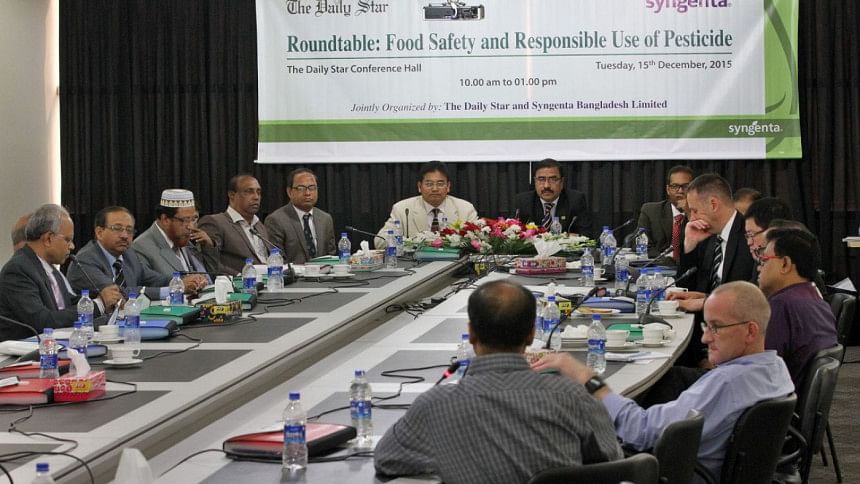Food safety, public health at risk

Substandard, fake and even banned pesticides are making their way into the market mainly because of lax monitoring, posing a grave threat to safe food production and public health, experts say.
Speakers at a roundtable yesterday also cautioned against the overdose of pesticides in agricultural production system and its subsequent health hazards.
Syngenta Bangladesh Limited, a leading crop protection company, in association with The Daily Star organised the programme on "Food Safety and Responsible Use of Pesticide" at The Daily Star Centre yesterday. The participants comprised of regulators, industry actors and farm experts.
Bangladesh Agricultural Research Institute (Bari) Entomology Division Head Dr Syed Nurul Alam informed the roundtable that the government has banned as many as 195 hazardous pesticides over the past few years.
This prompted Sher-e-Bangla Agriculture University Pro-Vice Chancellor Prof Md Shahidur Rashid Bhuiyan to point out that many of those banned pesticides were still being used in the country.
Agriculture Ministry Additional Secretary Anwar Faruque expressed a sense of urgency to tackle the evil practice.
He wondered how those pesticides, substandard and fake ones, were being marketed under the very nose of agriculture officials working at the grassroots.
Chairman of Bangladesh Crop Protection Association Musfiqur Rahman announced that they would take steps against such marketers, irrespective of their links with the association.
Other participants in yesterday's roundtable also emphasised on getting the market rid of counterfeit pesticides so that farmers get unlimited access to effective and quality agro-input from the companies who follow the industry's good practices.
Syngenta's Asia-Pacific Region Stewardship and Regulatory Policy Manager David Penna, its Managing Director in Bangladesh Md Sazzadul Hassan, Head of R&D Mahbub Rahman and Bari Entomology Head Dr Syed Nurul Alam gave four separate presentations at the roundtable, highlighting the importance of pesticides in food production, farmers' training and their awareness building.
With Prof Khandaker Shariful Islam of Bangladesh Agricultural University, Mymensingh, moderating the programme, The Daily Star Special Supplement Editor Shahnoor Wahid delivered the welcome speech.
Speaking as the chief guest, Agriculture Ministry Additional Secretary Anwar Faruque underscored the importance of judicious use of pesticides in safe food production.
He said because of poor affordability, many farmers go for cheaper pesticide products. He added that many good companies are losing market as the bad ones are being allowed to supply the low-quality pesticides.
Executive Chairman of Bangladesh Agricultural Research Centre (Barc) Dr Abul Kalam Azad said it's the responsibility of industry stakeholders to make the farmers sufficiently aware so that they don't overuse pesticides.
Syngenta MD Sazzadul Hassan said they have trained many farmers in Bangladesh to this end. He said they were also doing adaptive research in Bogra.
The roundtable was also participated by, among others, former executive chairman of Barc Dr Wais Kabir, HarvestPlus Country Manager Md Khairul Bashar, B-Safe Foundation President and ex-IRRI representative in Bangladesh M Zainul Abedin, Dhaka University teacher Dr Sirajul Hoque, Dhaka Medical College Hospital's Associate Professor Dr Md Robed Amin, Brri Entomology Head Dr Nur Ahmed, VSO Country Director Simon Brown, journalists Rezaul Karim Siddique and Ashequn Nabi Chowdhury and Syngenta officials, Dr Peter Loke, Md Ahsan Kabir, Dr Ziaur Rahman, Mohammad Habibullah and Mohammad Mosheur Rahman.

 For all latest news, follow The Daily Star's Google News channel.
For all latest news, follow The Daily Star's Google News channel. 



Comments